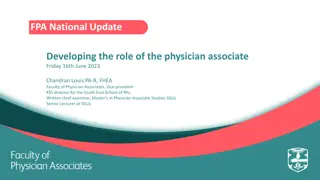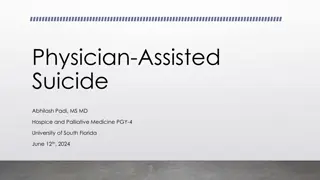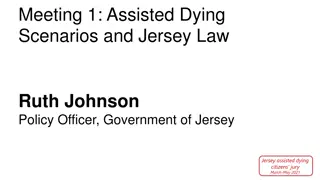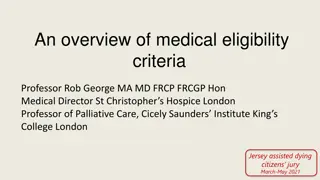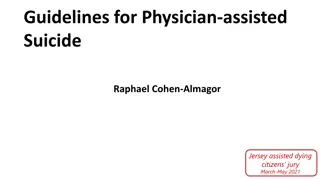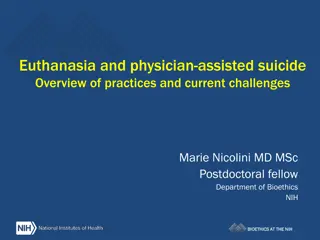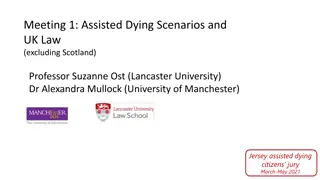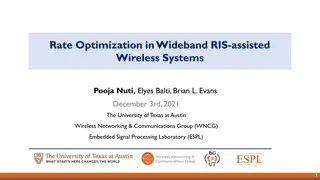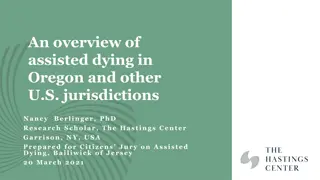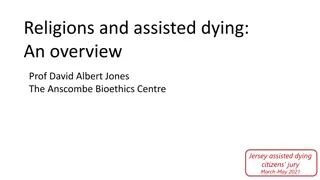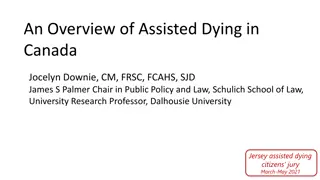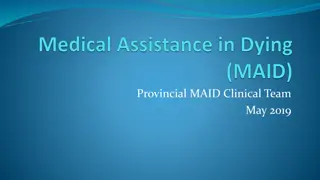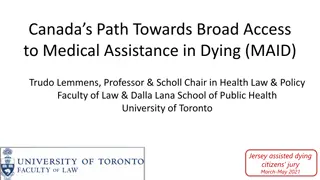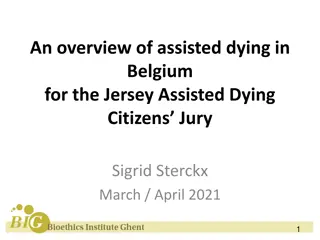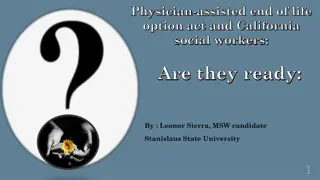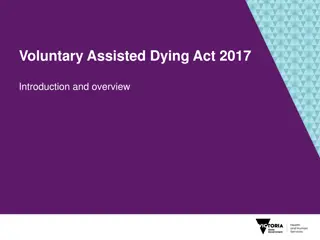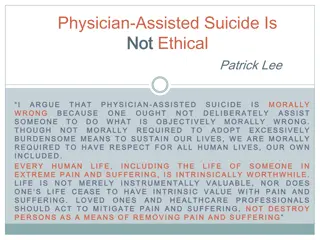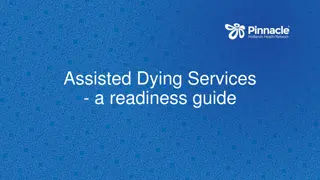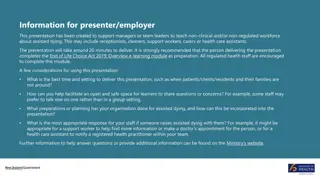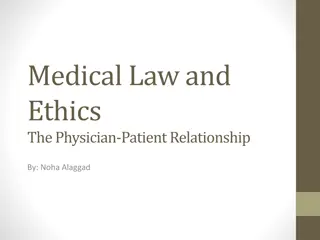Exploring Physician-Assisted Dying Laws in Canada
This content delves into the legality and ethical considerations surrounding physician-assisted dying in Canada, examining key legal cases such as Rodriguez v. British Columbia and Carter v. Canada. It discusses the conflicts between the Criminal Code and the Charter of Rights and Freedoms, highlighting the evolving perspectives on end-of-life care and the rights of individuals to make choices regarding their own death.
Download Presentation

Please find below an Image/Link to download the presentation.
The content on the website is provided AS IS for your information and personal use only. It may not be sold, licensed, or shared on other websites without obtaining consent from the author. Download presentation by click this link. If you encounter any issues during the download, it is possible that the publisher has removed the file from their server.
E N D
Presentation Transcript
Physician-Assisted Dying: Is Your Home Ready? Lisa Corrente (416) 643-8800 lcorrente@torkinmanes.com Together We Care Conference April 6, 2016
OVERVIEW Criminal Code v. Charter Rodriguez v. British Columbia (1993) Carter v. Canada (Attorney General) (2015 & 2016) An Act respecting end-of-life care (Quebec) Applications for Judicial Authorization Guidelines/Recommendations for Ontario Implications for LTC and retirement homes Key Considerations
Criminal Code v. Charter Everyone who counsels a person to commit suicide is guilty of an indictable offence and can be imprisoned for up to 14 years (s.241(b)) No person is entitled to consent to have death inflicted upon him, and consent does not mitigate criminal responsibility (s.14) Everyone has the right to life, liberty and security of the person (s.7) Everyone has the right to equal protection and equal benefit of the law without discrimination (s.15(1)) These rights are guaranteed, subject only to such reasonable limits prescribed by law in a free and democratic society (s.1)
RODRIGUEZ V. BRITISH COLUMBIA (1993) Rodriguez suffered from ALS Challenged the constitutionality of the Criminal Code provisions prohibiting assisted suicide Argued that criminal prohibition violated s.7 (which included right to die with dignity) and s.15 of the Charter SCC was split in its decision Majority found that any infringement of ss.7 & 15 rights did not outweigh the protections afforded to vulnerable people under the Criminal Code SCC did not invalidate the Criminal Code provisions on assisted suicide
Carter v. Canada (Attorney General) (2015) Case commenced by a group of individuals Gloria Taylor (ALS) and family of Kathleen Carter (spinal stenosis) Trial judge found that prohibition against PAD violates s.7 of Charter BCCA found that trial judge erred in not following the binding ruling in Rodriguez SCC held that blanket prohibition on assisted death unjustifiably infringes Charter rights
Carter v. Canada (Attorney General) (2015) Unanimous decision Rodriguez could be reconsidered new legal issues raised and social changes Most end-of-life treatments now hasten death and this approach to palliative care no longer considered active euthanasia Now we have sufficient means to protect the vulnerable possible to have a legislative framework that ensures safeguards for the vulnerable
Carter v. Canada (Attorney General) (2015) Defined PAD as the situation where a physician provides or administers medication that intentionally brings about the patient s death, at the request of the patient Sections 241(b) and 14 of the Criminal Code unjustifiably infringe s.7: Interfere with fundamentally important personal medical decision-making Deny opportunity to make a choice that is important to dignity and personal integrity Security of person impaired by forced physical and psychological suffering S.7 honours the value of life, and the role that autonomy and dignity play at the end of that life
Carter v. Canada (Attorney General) (2015) Absolute prohibition on assisted dying is overly broad Struck down Criminal Code provisions that stand in way of PAD Provisions are void insofar as they prohibit PAD for: Competent adult person Clearly consents to the termination of life Has a grievous and irremediable medical condition (including an illness, disease or disability) Condition causes enduring suffering that is intolerable to the individual in the circumstances of their condition Suffering cannot be alleviated by treatment available and acceptable to the individual
Carter v. Canada (Attorney General) (2015) Operation of order suspended for 1 year until February 6, 2016 To allow federal government to: enact new law which does not offend Charter coordinate with provinces about health law No physician can be forced to administer PAD if contrary to conscience or religious beliefs
Carter v. Canada (Attorney General) (2016) Federal government requested an extension needed more time to respond to Carter 2015 SCC suspended declaration of constitutional invalidity for another 4 months until June 6, 2016 In the interim period: Persons seeking PAD can apply to superior court in their jurisdiction for an order allowing PAD based on meeting Carter criteria Exemption from extension granted to Quebec
An Act Respecting End-of-Life Care (Quebec) Assented to on June 10, 2014 The Act: regime for end-of-life care (terminal palliative sedation and medical aid in dying (MAID)) established Commission to oversee the specific requirements for MAID framework for a system of advance medical directives (format, validity and registration) End-of-life care must be offered in every institution providing healthcare Institutions must have a policy on end-of-life care Institutions must collect and report statistics (requests and refusals)
An Act Respecting End-of-Life Care (Quebec) Terminal palliative sedation can be requested by patient or SDM MAID can only be requested by adult capable patient who meets specific criteria (which are more rigorous than Carter criteria) Does not allow MAID to be requested through an advance directive Health care professional can refuse to take part in end-of-life care Complaints regarding treatment or service can be made to the Commission
Applications for Judicial Authorization on PAD Until June 6, 2016, persons can apply to superior court in their jurisdiction for an order allowing PAD based on meeting Carter criteria (other than Quebec) At least 4 such applications in Canada to date: Alberta Manitoba Ontario British Columbia
A.B. v. Attorney General of Canada et al. (Ontario) March 17, 2016 decision First case in Ontario 81 year old man with advanced-stage aggressive lymphoma Court found that he satisfied Carter criteria PAD administered the following day
A.B. v. Attorney General of Canada et al. (Ontario) Competent adult capacity must be proven, no presumption of capacity Should have evidence from consulting psychiatrist Grievous medical condition range of critical, life threatening, or terminal Medical condition must be predominant source of grievous pain Pain and suffering (not medical condition) which cannot be alleviated by treatment acceptable to person
A.B. v. Attorney General of Canada et al. (Ontario) Court entitled to take a flexible approach to the evidence Affidavits from applicant, attending physician, consulting psychiatrist, physician proposed to assist with death If Carter criteria are satisfied, person entitled to PAD court has no discretion Coroner need not be notified Cause of death is the medical condition PAD is a form of treatment
Guidelines/Recommendations for Ontario CPSO Interim Guidance on PAD CMA Principles-based Recommendations Ontario Practice Advisory Discussion Papers by Joint Centre for Bioethics, U of T Provincial-Territorial Expert Advisory Group on PAD Report of the Special Joint Committee on PAD Palliative and End-of-Life Care Provincial Roundtable Report
Implications for LTC and Retirement Homes Available wherever a person lives LTC and retirement homes Objections by faith-based facilities? Advise of home s position and all end-of-life options Transfer of patient to a non-objecting institution for assessment and administering PAD Religious/conscientious objections by physicians allowed Involvement of various health professionals (physicians, nurses, pharmacists) PAD may be available to residents with terminal and non- terminal grievous and irremediable medical conditions Including psychiatric conditions (psychological suffering) Will residents with dementia be excluded?
Implications for LTC and Retirement Homes Advance requests for PAD may be permitted (after diagnosis) Unlikely to accept consent from SDM No prior judicial review or approval who determines eligibility? (e.g. 2 physicians) Appeal process? Reporting requirements (Coroner, Ministry/RHRA, national reports) Development of new policies and procedures Training for staff Complaints to Ministry/RHRA about PAD services
Key Considerations in the Interim Prior to Inquiries/Requests: Know your legal and professional obligations Review guidelines (e.g. CPSO, OCP, CMA, JCB) Form an internal advisory group who can deal with resident and family inquiries/requests Medical director, DOC, social worker, head office representative, lawyer Identify health practitioners willing to support PAD Resource, document, provide medical opinions/consultations, guide discussions with residents and families, administer PAD Allow for conscientious objections and effective referrals Compile general information for residents (available upon request, provide to Residents Council and Family Council)
Key Considerations in the Interim If Inquiries/Requests are Received: Refer all inquiries/requests to internal advisory group Inform resident of requirement for a Court order and advise resident to obtain independent legal representation Refer to guidelines Consult with insurer (e.g. CMPA) and legal counsel Court order to exempt health practitioners and home Maintain confidentiality and open communication between resident and health practitioners involved


